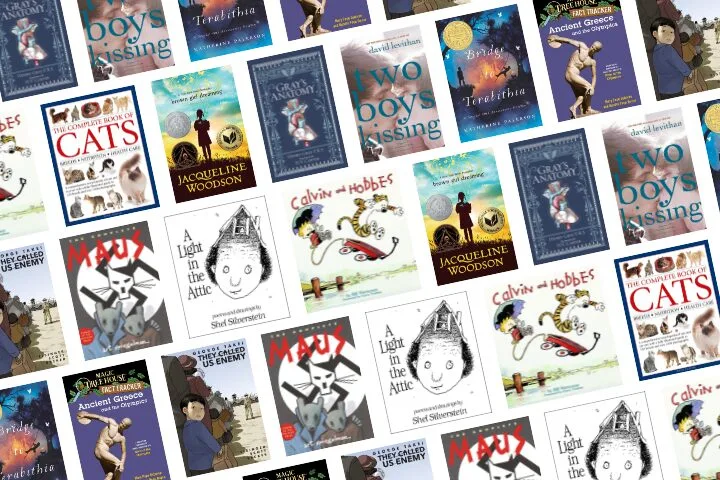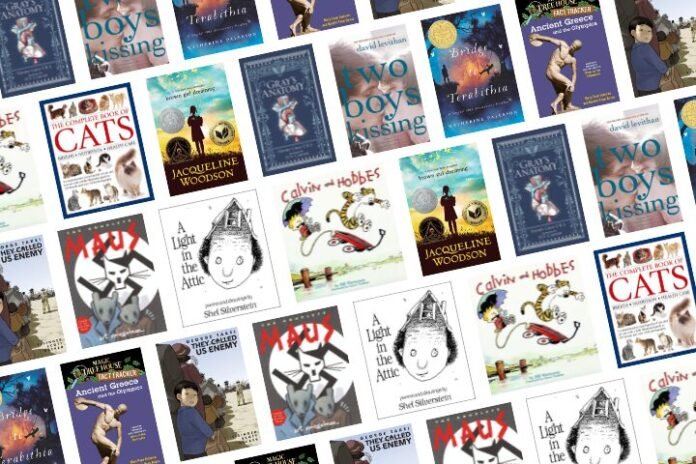
Magic Tree House author Mary Pope Osborne, children’s poet Shel Silverstein and Calvin and Hobbes cartoonist Bill Watterson have joined Judy Blume, Sarah J. Maas, Eric Carle and Kurt Vonnegut on a mind-boggling list of hundreds of books purged from some Tennessee school libraries.
Osborne is the author of the widely acclaimed and enormously popular Magic Tree House series, which sends siblings Jack and Annie time traveling to historical settings for various adventures. A book she wrote with her sister, Natalie Pope Broyce, called Ancient Greece and the Olympics, a Magic Tree House Fact Tracker meant to be a learning companion to Magic Tree House #16: Hour of the Olympics, is among a staggering 574 books purged from Monroe County’s school libraries. The book features a nude Greek statue on the cover.
The removals are the result of a growing political movement to control information through book banning. In 2024, the state legislature amended the “Age-Appropriate Materials Act of 2022” to specify that any materials that “in whole or in part” contain any “nudity, or descriptions or depictions of sexual excitement, sexual conduct, excess violence, or sadomasochistic abuse” are inappropriate for all students and do not belong in a school library. This change means books are not evaluated as a whole, and excerpts can be considered without context, if they have any content that is deemed to cross these lines. This leaves no room for educators and librarians to curate collections that reflect the real world and serve the educational needs of today’s students.
The results of this overcompliance are alarming. They include Monroe’s 574 titles, more than 100 titles taken off the shelves in Knox County, over 150 titles removed in Rutherford County, over 300 banned in Oak Ridge Schools and over 400 in Wilson County. And that’s not even every county in the state impacted.
The lists of banned books range from Silverstein’s A Light in the Attic, which includes some line drawings that depict bare bottoms, to books featuring LGBTQ+ youth like Two Boys Kissing by David Levithan to historical accounts like They Called Us Enemy by George Takei and Hidden Figures: The American Dream and the Untold Story of the Black Women Mathematicians Who Helped Win the Space Race, by Margot Lee Shetterly.
Oak Ridge Schools, where a significant number of the bans target art history books, even removed Richard Jolley: Sculptor of Glass, a collection of works by the artist, who graduated from Oak Ridge High School.
“Regarding the book written by Mr. Jolley, we were thrilled to feature a book written by an ORHS alumni on our shelves and were equally disappointed to have to remove it,” Molly Gallagher Smith, an Oak Ridge Schools spokeswoman, told WBIR. “Unfortunately, as an artist, Mr. Jolley’s book features depictions of the human body that are in direct violation of the law.”
It’s not just nudity depicted in drawing and sculpture: Some purged titles are American classics with a long history of being banned, like Harper Lee’s To Kill a Mockingbird and John Steinbeck’s The Grapes of Wrath. Others have been highlighted nationally as book bans have spread in the past few years, including In the Dream House by Carmen Maria Machado, The 57 Bus by Dashka Slater and Laurie Halse Anderson’s Speak.
Among the most disturbing bans are books focused on the Holocaust. The Monroe County list includes more than a dozen titles, including Art Spiegelman’s Pulitzer Prize-winning graphic memoir Maus, The Hidden Children of the Holocaust by Ester Kustanowitz, which tells the stories of teens who hid from the Nazis, and Secret Holocaust Diaries: Nonna Bannister, which details the experiences of a Russian girl from a wealthy family who survived the German labor camps and lived out her life in Tennessee. The book explores how she “learned the value of human life and the importance of forgiveness,” but students there can no longer share in her lessons.
Also included in some of the lists are an array of titles often studied in classrooms, including The Bluest Eye by Toni Morrison, Ray Bradbury’s Fahrenheit 451, Alice Walker’s The Color Purple, and S.E. Hinton’s The Outsiders.
Indeed, the varying numbers of books banned by different districts point to the difficulty schools face when attempting to implement such broad laws. Their efforts have resulted in an incredible slate of books removed from Tennessee students’ reach, spanning topics from history to race, religion, and the LGBTQ+ community.
And many of the bans are coming without any review or discussion. The Tennessee Association of School Libraries found in a survey of its members that in 20% of school districts, books were removed from the shelves at the command of district leaders without any sort of review process. “Librarians and educators are concerned that we will end up pulling a massive amount of books without looking at the books as a whole,” one member said in the survey. “It’s a slippery slope,” said another, “and I’m fearful of the next topic that will be regulated.”
“The floodgates of censorship have burst open in Tennessee,” said Sabrina Baêta, senior program manager with PEN America’s Freedom to Read program. “The only thing that all these banned books have in common is the fact that they’re banned. Looking at the lists, practically anyone would be able to find a book they value being villainized and removed. And time and time again, the students are those most hurt by these empty shelves.”
As of May, at least 15 states, including Tennessee, have enacted laws facilitating the censorship of school library collections by expanding definitions of terms such as “sexually explicit,” “obscene,” and “harmful to minors,” requiring districts to apply such terms in new ways, or risk civil or criminal liability for materials with sexual content. These accelerating bans in Tennessee are putting the Volunteer State on par with states like Florida, Iowa, and Texas, among those that have removed the most books from school shelves in recent years.
Among the titles on Rutherford County’s banned book list is the most banned book of the 2023-2024 school year, Nineteen Minutes by Jodi Picoult, a book about the events leading up to a school shooting, and Monroe County’s bans include multiple books about Columbine, the Virginia Tech massacre, and gun control.
The actions follow dozens of book bans in the state in the 2023-2024 school year. In Rutherford County, PEN America is among the plaintiffs in a lawsuit challenging the removal of more than 145 books banned under ambiguous criteria for sexually explicit and obscene materials.






